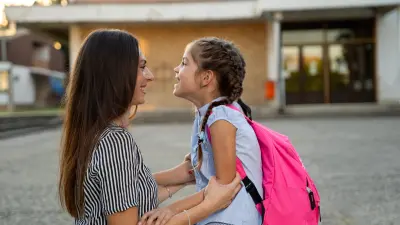Hey Mama! We see you juggling all the things, and we’re here to make life a little easier. If you love podcasts but don’t always have the time to dive into hours of episodes, we’ve got your back! In this episode of Raising Good Humans: 10 Proven Ways to Foster Adaptability and Flexibility in Kids, we’ve rounded up the top takeaways to give you a head start.
Raising Good Humans Podcast Summary: 10 Proven Ways to Foster Adaptability and Flexibility in Kids
In today’s fast-changing world, raising adaptable and flexible children is more important than ever. Whether facing unexpected challenges or navigating everyday changes, children who can adjust with ease are better equipped for success. In this episode of Raising Good Humans, Dr. Aliza Pressman shares 10 practical ways to encourage adaptability and flexibility in kids. From modeling adaptive behavior to promoting curiosity and problem-solving skills, these strategies help children thrive in an unpredictable world. Discover actionable tips to foster resilience and prepare your child to embrace change with confidence.
1. Model Adaptability
Children learn adaptability by observing how adults handle change. Dr. Pressman suggests sharing moments when you’ve adjusted your plans and how you coped with it. This real-time modeling shows that change is manageable. She emphasizes that how parents react to change directly influences how children will respond, noting that “our adaptability is contagious.”
2. Introduce New Experiences
Regularly expose children to new environments, activities, and perspectives. Small changes, like switching seats at the dinner table, can strengthen adaptability. For children who struggle with change, start with minor adjustments to gradually build their tolerance. Pressman encourages parents to “exercise the muscle of adaptability” with small, consistent challenges.
3. Encourage Problem Solving
Teach children to view unexpected situations as problems to solve rather than obstacles. Dr. Pressman suggests narrating your thought process when addressing problems, helping children develop critical thinking skills. “Ask your kids for ideas,” she advises, noting that even bad ideas offer learning opportunities and promote flexible thinking.
4. Practice Mindfulness
Mindfullness helps regulate emotional responses, making it easier to adapt to change. Simple exercises like deep breathing or focusing on sensory experiences ground children in the present. According to Dr. Pressman, “Mindfulness tells your nervous system that something uncomfortable isn’t a threat,” which is crucial for developing adaptability.
5. Promote Curiousity
Encourage children to ask questions and explore new ideas. Using phrases like “I wonder what would happen if…” helps children engage with uncertainty in a safe, imaginative way. Dr. Pressman suggests that curiosity reduces rigidity and “makes the world feel bigger and more flexible.”
6. Discuss the Importance of Change
Normalize and celebrate change as a pathway to growth. Sharing personal stories about how change led to positive outcomes helps children embrace new experiences. Dr. Pressman recalls her childhood experience with dance, explaining how fear of losing her identity delayed an important change, highlighting the value of embracing new paths.
7. Play Games That Require Rule Changes
Engage in games where the rules shift to build cognitive flexibility. Modifying games like “Simon Says” or “Musical Chairs” teaches children to adjust their strategies quickly. These playful experiences foster quick-thinking and adaptability, as children must “shift attention and respond to changing conditions,” Pressman explains.
8. Encourage Open-Mindedness
Foster an open attitude toward new ideas and approaches. For example, encourage children to try different study methods or activities outside their comfort zones. Pressman suggests asking, “What’s one thing you don’t like that you could find something good in?” to gently challenge rigid thinking.
9. Support Your Kids’ Decisions
Allow children to make decisions and experience their outcomes. This empowers them to learn from mistakes and adapt future choices. Dr. Pressman encourages giving children control over their schedules within a framework, noting, “If you do everything for your kids, you take away their opportunity to learn flexibility.”
10. Reflect on Challenges
After a difficult situation, discuss what worked and what could change next time. Reflection helps children process experiences and develop better coping strategies. Dr. Pressman emphasizes that these conversations should happen when everyone is calm: “That’s when their brains are available to reflect and grow.”
Small Changes, BIG Impact!
Building adaptability and flexibility in children is a lifelong gift that helps them manage uncertainty and face challenges with confidence. By incorporating these 10 strategies—like modeling adaptability, encouraging problem-solving, and fostering curiosity—you empower your child to navigate life’s ups and downs with ease. As Dr. Aliza Pressman emphasizes, small changes and mindful practices can make a significant difference over time. Start implementing these techniques today to support your child’s growth and resilience in an ever-changing world.
Be sure to check out the full episode of the Raising Good Humans podcast HERE!









Leave a Reply